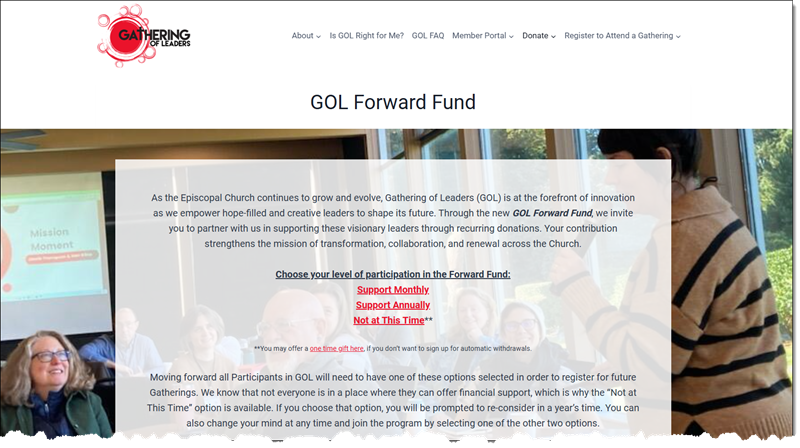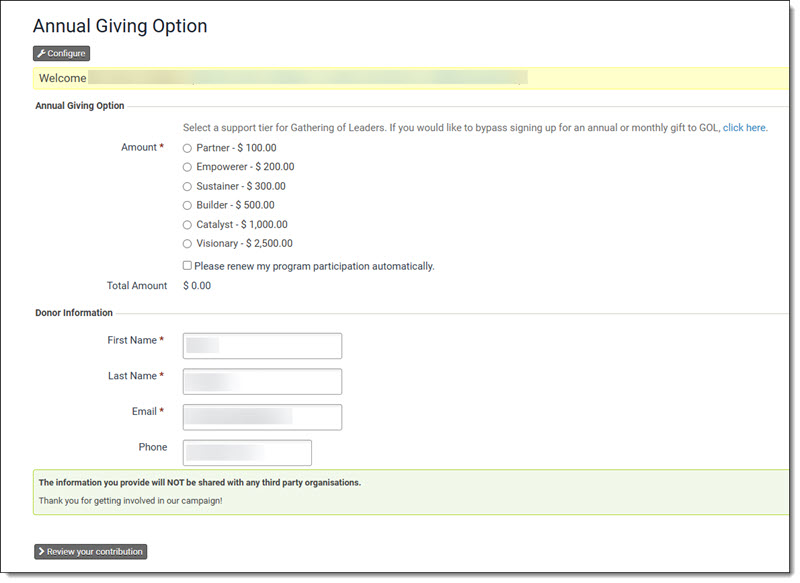CiviCRM Case Study: Annual/Monthly Contribution Model for Event-Driven Non-Profit
Introduction
Gathering of Leaders is a non-profit organization dedicated to the empowerment and development of leaders within the Episcopal Church. They do this by providing a place for leaders to come together to support each other through mutual encouragement, deepen their skills as transformational leaders, and establish networks which aid their ministries.
Providing these spaces for leadership development and spiritual growth through their Gathering events, the not-for-profit faced a strategic challenge. Their revenue model relied heavily on event registration fees which limited their ability to sustain and expand their mission-critical programs. This case study explores how they leveraged CiviCRM Membership module to create a more sustainable funding approach while maintaining their commitment to accessibility for all Church leaders.
The Challenge
Gathering of Leaders’s revenue stream was almost entirely dependent on fundraisers and whatever small profit could be gleaned from event registrations. Without a formal membership structure or paid subscription model they had no way to ask constituents to make ongoing financial contributions. They also recognized that some of their constituents might not be able to contribute anything; they didn’t want to restrict this segment from registering but were unsure how to track them.
The Solution
Tadpole helped develop a system using WordPress and CiviCRM to gate access to event registration behind an appeal for a recurring contribution. The “Forward Fund” page encourages constituents to partner with Gathering of Leaders to ensure the long-term success of their mission, presenting them with three ways to participate.
Within the CiviMember module we set up three membership types: Monthly Giving, Annual Giving, and Decline Participation. Monthly and Annual Giving show options for different levels of recurring donations with payments captured and processed by Stripe. Constituents who select either Monthly or Annual Giving have their memberships set to auto-renew, guaranteeing continued recurring contributions into the GOL Forward Fund.
The Decline Participation membership type allows constituents to opt-out of making any recurring contribution into the Forward Fund program for one year. When their memberships expire, anyone who opted to Decline Participation this year will be prompted again before being allowed to register for any future events. There is no restriction against declining to participate in the next year, but constituents are asked to give if they can.
Those who Decline Participation will be prompted each year as their membership expiration date approaches.
When a constituent makes a recurring contribution or declines participation, they are added to CiviCRM Group. Event pages on the website are gated to let only members of a corresponding WordPress Group through to the registration forms. The CiviCRM Member Sync plugin is used to keep parity between the CiviCRM database and WordPress website.
Conclusion
The Gathering of Leaders successfully leveraged CiviCRM and WordPress to create a sustainable funding model that aligns with their mission and values. By implementing a contribution-gated event registration system, they were able to diversify their revenue streams beyond relying solely on event fees.
The new approach provided several key benefits:
- Increased the number of constituents making recurring financial contributions to support the organization’s critical work.
- Reduced the organization’s dependence on event registration as the primary revenue source, creating a more stable and predictable funding model.
- Maintained accessibility by allowing constituents to decline the contribution requirement for a one-year period while still prompting them to participate again the following year.
This solution demonstrates the power of CiviCRM’s Membership module to help non-profits like the Gathering of Leaders balance their need for financial sustainability with their commitment to serving all who are called to their work.
The lessons learned through this implementation can serve as a valuable case study for other non-profit organizations seeking to develop innovative funding approaches that preserve their core values and expand their capacity to fulfill their missions within their communities.


